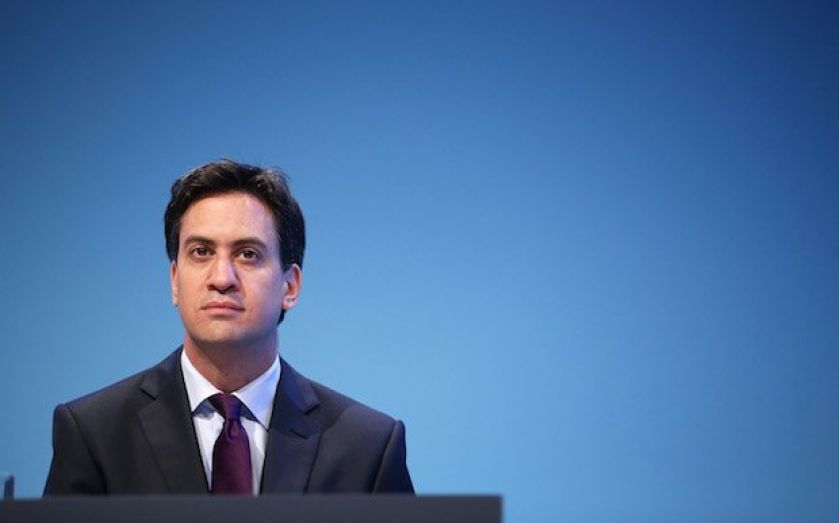More competition would be good but Miliband is proposing little that’s new

ED MILIBAND appears to be in the process of reinventing the Labour Party as the consumer party. His central theme is the “cost of living crisis”. He tells us how he is on the side of consumers in gas and electricity, freezing prices, in banks forcing competition, and in general by having consumer bodies report on the health of competition in “broken markets”.
I am instinctively sympathetic to him in much of this. I am sceptical about his solutions, as I shall explain in a moment. But that doesn’t mean some of his solutions aren’t worth trying – the alternatives haven’t worked terribly well either.
On Friday, he told us about the banks. He wanted to create two new challenger banks and to set thresholds for the maximum market shares of banks in mergers and acquisitions. Many pro-market types have thrown up their hands in horror, bewailing more banker-bashing. And perhaps there was more than a bit of that going on in what he said. But let’s not allow that weakness to obscure some key points.
The UK banking sector probably is too concentrated. The main quasi-nationalised banks, Lloyds and RBS, have been subjected to requirements under EU competition rules to dispose of some branches and assets, most notably resulting in the re-birth of the TSB brand. But that does not go far enough in at least three ways.
First, EU competition and state aid rules would almost certainly mean that, eventually, EU competition authorities would require further disposals of assets by Lloyds and RBS if their main businesses are to continue to receive state backing. In opposition, George Osborne mooted the idea of privatising the three nationalised banks (Northern Rock, RBS and Lloyds) as six banks – so three extra ones. Setting aside likely minor instances (such as Ulster Bank), we already have TSB, so that’s one. Miliband wants two more, matching Osborne’s original target.
Breaking up nationalised businesses on privatisation to encourage competition is in the best traditions of 1980s thinking. Market-oriented wonks should not object to that. There are three key things to note about this, however. First, the government would be likely to make less from the sale if it breaks the banks up. Second, the natural way to break them up would be as competing entities with a similar range of businesses to now, rather than doing any of the “investment-retail” type splitting recently discussed. Third, smaller broken-up banks would be more likely to go bust – indeed, one should consider it very likely that at least one of those six banks would go bust within a decade. Would Miliband be happy to embrace bank failure as competition in action?
Second, and related to the above, the key obstacle to competition in the banking sector is government bailout guarantees. A successful new entrant needs, like a cuckoo, to be able to push the existing birds/banks out of the nest/market. Reforms such as bailins for bondholders have gone some way to limiting implicit bailout guarantees, but are not yet fully credible in the UK.
Third, and related to the above, it would be useful to have some restrictions on mergers and acquisitions in the banking sector, of the general form Miliband identified. There are already general principles and thresholds that apply to all businesses – Miliband’s proposals are actually pretty close to what already exists. But because of the systemic nature of banks, becoming very large creates a implicit threat to governments that bank failure will be socially disruptive, making it more likely that governments will bail them out. As a consequence, banks face a commercial incentive to become too big to fail if they can. I have previously proposed introducing an additional hurdle into merger law (applicable to other businesses such as car companies as well as to banks, but most obviously relevant to banks) to reflect systemic risk. The coalition chose not to pursue the idea. Perhaps Miliband will.
But this illustrates a general issue with Miliband’s message. For most of what he proposes – merger thresholds, regulation of gas and electricity prices, the consulting of consumer bodies by competition authorities – already exists, and it’s not clear what he wants that is truly new.
Furthermore, when he alleges markets are broken, what does he mean? Utilities subject to price regulation manifestly don’t have effective competition – that’s why they’re regulated! It would be nice to get more competition there, but does he really have a scheme? If he wants “broken markets”, he really ought to get more competition into health and education – but I suspect his pro-market sentiments might not extend that far.
Andrew Lilico is chairman of Europe Economics, and fellow at the Institute of Economic Affairs.